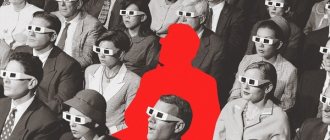Hello, dear readers! Ruslan Tsvirkun is with you and in this article I would like to tell you about the Introvert and his types. An introvert is a person who has a special way of thinking, who lives more in the inner world than in the outer world. Such people are more restrained and thoughtful, the proverb 7 measure twice, cut once, this is about them.
Why you need to know your type
Knowing yourself will allow you to study your shortcomings and advantages. What you were scolded for and considered bad for may not be your personal fault. What happened was that they tried to forcibly take you out of your natural state, like a fish out of water.
Will help you choose your profession (or hobby) in life, where you have advantages over others. Some people, not knowing their abilities, try to succeed in something that does not suit them, and spend a lot of time studying with zero results. Because life energy does not flow along the chosen information channel.
People interested in various relationships will also receive information on how they can more easily avoid conflicts.
Tests to find out your psychotype
I found 3 tests for you:
- Determination of character type according to Jung. Answer 20 questions, where you choose one of two options. If your scores are in the middle, and this is 35–65 points, then you still fall into 35% of people with traits of extroversion and introversion.
- Test to determine Eysenck's temperament type. This test has 60 questions that will help you determine your temperament type, extroversion or introversion. Travel time is approximately 5 minutes.
- Test “Who are you: extrovert, ambivert or introvert.” You need to answer 8 questions. I took this test and found out that I am an ambivert. A very convenient and quick test, a kind of express diagnostics.
Definition of Introvert
An introvert is one aspect of a whole group of personalities. At first glance, he is a single person.
The basis of personality is the mechanism of the subject’s focus not on an external object, but on psychological subjective factors. The word “intro” itself means a direction (verticality) inwards, towards oneself. So to say, this would not be entirely true; nevertheless, a person cannot objectively see or accurately sense his essence. He can only direct his attention to the internal process - thinking or monitor his state (mood).
In general, an introvert's energy is contained within the individual. An introvert retains and accumulates more information and energy than he spends. In this case, the introvert’s behavior is passive; he quickly gets tired of people.
An attempt to demonstrate active, comprehensive activity, like an extrovert or an introvert, risks burning out and temporarily destroying the innate personal structures. By temperament, they are often found to be quiet; a neutral or slightly sad mood predominates.
The main sign of introversion is external isolation, isolation from the world. Personality is hidden. Since an introvert generates psychic energy himself, he needs temporary periods of seclusion, although this seems to be a problem for others.
Loneliness is a normal, comfortable state for an introvert. You should not encroach on his inner freedom. And break his rules.
The passive position of an introvert (saving energy) is manifested in the ability to be a good listener. An introvert often refuses to go to a noisy party or a place where there are a lot of people. If you manage to persuade a person to go, you should expect that the introvert will go home before the end of the party.
At first glance, an introvert seems emotionally cold, isolated, and nothing touches him. But that's not true. All emotions and experiences are hidden inside and have a deep meaning that is not always expressed in words. An introvert has a greater power of consciousness to restrain himself. Express emotions moderately when necessary.
Introverts prefer activities such as reading books, playing chess, and writing. In relationships, an introvert has a dual nature; he can be both naive and wary at the same time. This is explained by the fact that the ideas and thoughts of introverts are rarely related to real and everyday topics and are detached and eccentric in nature.
It is very difficult for an introvert to understand his ideas. However, when thoughts coincide with the thoughts of the interlocutor, the introvert experiences, like any person, an energy impulse, an uplift in mood and special trust in the interlocutor. And I’m ready to let you into my “secret world.”
The meaning of a typical introvert's actions and words does not always coincide with the generally accepted meaning in reality. Self-expression and speech are fragmentary and symbolic. In the psychological characteristics of an introvert, there are no leadership qualities in the foreground.
In public, an introvert is very worried, and it can be difficult with people. Introverted artists often have inappropriate actions, such as running away from the stage.
Communication with the opposite sex is sometimes accompanied by uncertainty and timidity. In some cases, far-fetched. The contradictory thoughts of an introvert are explained by the fact that in the field of consciousness there is also an irrational thought that affects a personal motive and a rational thought - objective circumstances.
SUPERID block* 5th position* Suggestive function* “Volitional sensory”
Balzac respects strong people who understand their goals well, who do not give in to difficulties and confidently make their way - these are precisely the qualities that his dual Caesar possesses.
Balzac never strives to lead, preferring to remain a “number two” figure - a “shadow” leader under a powerful patron.
Simple and democratic by nature, he does not boast of the high position he has achieved or his influential connections. Knowing full well that “everything passes,” Balzac is not one of those who would lay down his life and health for the sake of a brilliant career. Even at the pinnacle of power, he is first and foremost a man who does not hide his weaknesses, tastes and habits.
Nevertheless, Balzac has a deep sense of self-esteem. Knows how to respect the dignity of others and knows how to demand respect for himself.
Although it is difficult to demand exactly Balzac. He is one of those who find it difficult to “gather the will into a fist.” Balzac does not know how and does not like to subjugate anyone to his will. He also does not tolerate direct volitional pressure on himself. (Caesar’s volitional influence, realized by ethical manipulations, is not perceived by him as suppression of his own personality. While the straightforward volitional influence - the “volitional sensory” of Zhukov, Maxim or Dreiser, as well as the demonstrative assertiveness of Hugo - suppresses him.)
Balzac is characterized by a constant semi-relaxed state. Balzac prefers not to make unnecessary volitional efforts and tries to spend his physical energy very sparingly. He will not invest more effort into any work, even the most exciting one, than is dictated by objective necessity. He is not one of those who will “give all his best” on “naked enthusiasm.” Balzac demands respect for his own work and decent payment for it.
Money is of no small importance for Balzac (although some representatives of this type treat its absence with philosophical calm: “Money is just money: it comes and goes”). Nevertheless, Balzac is deeply and seriously aware of the advantage of money as a real lever of strength and power. You rarely meet Balzac who calmly accepts their absence even if there is a “minus” in the bank. On the contrary, many of them see money not only as support for themselves, but also as a guaranteed opportunity to realize long-planned plans (“As soon as I want, palaces will be erected...”)
Accumulating money for Balzac is also a way of “conserving” one’s own invested labor, an opportunity to preserve and rationally redistribute one’s own forces. For Balzac, money is the “equivalent of strength,” saved in his youth in order to support the future infirmity of old age.
Types of introverts
Social psychology divides people into several personality types. The famous psychoanalyst Jung also worked on describing various archetypes. Although there are 16 sociotypes (or archetypes), in fact the human personality has a general structure.
The main difference is the specific direction of vital energy. Unfortunately, we cannot succeed in all areas of life, and this same energy and mental resources are drawn to where we know and are most capable. The psychotype is formed from childhood and is the basis of personality.
Introvert intuitive
If introversion is based on intuition, then we get a personality type that is carried away by its own imagination and dream. The thought process is accompanied by the emergence of various ideas that are not always feasible. Ideal ideas about love, freedom, the structure of society. Psychologically, this type has some varied changes in states. Manifestations of excessive curiosity, despite outward indifference. They have strong introspection. Negative traits can be suspiciousness and suspiciousness.
Sensory introvert
If introversion is based on a sensual type, then the character turns out to be more or less stable. Somewhat conservative, attentive. The personality is well oriented in its physical sensations. Often, he tries on the physical condition of others for himself. For this type of personality, order and mathematical precision are important. Negative traits: excessive pedantry.
Logician introvert
Introverted logician - this type of person has ordered thinking over the emotional sphere. A person understands more “non-living” relationships - cause-and-effect relationships. They can easily build and describe a system of some phenomenon in nature. Since there is also a focus on one’s own thoughts, there can be theories about self-knowledge and introspection. Without the ability to understand the ethics of relationships, the logician tends to simplify them - for example, simply leave the meeting place or not pick up the phone if he is not in a good mood.
Ethical introvert
An introverted ethicist, the emotional sphere prevails over logic. Even if an introverted ethicist does not express all his emotions, he can very acutely experience both other people’s problems and his own. Tries to understand his internal conflicts. This type of personality has good qualities and talent as a psychologist. An ethical introvert feels uncomfortable when receiving a late phone call, and even if he answers, he will politely ask to call back and apologize.
The introvert was rational
Rational - introvert - this type, even if it is an ethicist, tends to bring his emotions and desires under reasonable explanations (rational meaning). In some cases, a person tries to choose a favorable position or result for himself. The sequence of actions is also assigned to this sign - first, what needs to be done, and then, what you enjoy. (“first the main course, then dessert”). Committed to their idea or plan until the end.
Introvert irrational
An irrational person is an introvert and tends to put rational action into the background. An irrational person listens more to irrational feelings (intuition, emotions), follows the call of his heart or even a sense of curiosity. Tends to satisfy desired actions first. Unlike rationality, performance very much depends on the decrease and increase in physical energy and mood. Irrationals easily give up their previous attitudes and idols (if they disappointed).
ID block * 7th position * Observational function * “Intuition of possibilities”
It seems that Balzac consciously does not want to see positive trends in the phenomena around him - and he really does not want this. Not consciously, but subconsciously.
Of all the possibilities he observes, he subconsciously notices only those in which he assumes a hidden danger. (He sees his purpose in this.)
In Balzac's understanding, only those possibilities that are least negative are positive. In other words: what is least bad is best. Therefore, Balzac’s observation of potential opportunities is, first of all, taking into account and analyzing all the “minuses”.
The narrowly pessimistic analysis of observations is explained by Balzac’s subconscious orientation towards the exorbitant optimism of his dual Caesar and is a kind of defense against it. Therefore, Balzac’s pessimism constantly “gains” the necessary “margin of safety”: both to “insure” itself and to “cool down” the dual.
(Try to convince Balzac that his fears are in vain - he gets irritated, and an expression of fear instantly appears in his eyes. He really becomes afraid, and first of all for himself.)
The strength of Balzac's intuition lies in his “positive” pessimism, which allows him to take into account all possible complications in the implementation of his plans. Forcing you to subconsciously calculate the time it takes to complete work, taking into account the forcedly reduced pace: for “swinging”, for fatigue, for distracting interference, for unforeseen complications.
Balzac is the only one who takes into account such a factor of time consumption as the inertia of any undertaking. In any business, he tries to insure himself with the necessary material base - a “margin of safety”, counting on the inertia of the “swing”.
Balzac never counts on quick success and quick income - he considers this unforgivable adventurism.
He tries not to go “ahead” (and warns his dual against this), but “to go around”. He knows how to get out of a difficult situation himself and will teach others how to do it.
One can only envy his insight and foresight: he is careful, prudent, and taciturn. He prefers not to give far-reaching advice; he always tries to suggest a way out of a specific difficult situation.
He does not advertise anything unnecessary - he is deliberately undemonstrative, and does not make any promises “in advance.” He is not inclined to take anyone’s sensational ideas on faith; he tries to figure everything out himself.
He often laments his own missed opportunities - an inevitable consequence of his passively observant attitude towards life.
The difference between an introvert and an extrovert
An extrovert is more sociable and always strives to increase his contacts and relationships with different people. It is easier to notice everything that happens around – events, people.
An introvert always tries to limit his contacts. Even communication with loved ones and friends occurs in the interval between long periods of loneliness. Contacts do not last long, even if this friendship is for life. If there are tangible material obstacles, an introvert may end the relationship forever, since he will not be able to constantly demonstrate increased activity and goal-oriented behavior.
For an extrovert, communication causes a state of vivacity and overexcitation. An introvert feels empty during intense contact with people.
An extrovert moves more, participates in various events, and tries to be on time everywhere. An introvert tries to narrow the range of his interests, however, if a person is interested in sports, then skiing lessons are done without an audience.
Psychologists consider restraint and thoughtfulness of actions to be the advantage of an introvert. Plus – there is no tendency to “spray” energy onto the environment. An extrovert often dissolves in the outside world at the peak of activity and does not see himself in it.
general description
- Differs in accuracy and specificity in business relationships. Works out details in detail, carefully prepares events. Matters are put above sentiments. Follows laws and regulations and keeps personal belongings in order. You can always rely on him. Endures life's adversities with steadfastness.
- A person of strong-willed endurance is assiduous and resilient. Persistent and demanding in carrying out orders, as well as checking them. Takes care of those who are confused, explaining how the work needs to be done. He is a sober realist in his assessments and does not tolerate fruitless fantasies. He proves that he is right by citing numerous facts he has collected.
- When communicating with friends and colleagues, he is polite and courteous. Able to give the impression of an intelligent and well-mannered person. However, in close relationships it changes towards greater cruelty. Despite the fact that he can be sociable in a small circle, he needs privacy. Shows a penchant for edification, preaching ethical standards.
- What he can do himself, he demands the same from others. Diving deeply into details and numbers risks losing the breadth of your review. Uncompromising in his beliefs. The collapse of the ideals that he followed for a long time turns into a personal tragedy for him. Distrustful of strangers about whom there is no information. Having noticed something negative about a person, he loses trust in him for a long time.
Misconceptions about introverts
1. Introverts don't like to talk. This is not true, I must tell you that if the conversation is not interesting, the introvert will find it pointless to waste emotional and verbal effort on it.
2. Introverts are shy in public. A person can be shy or bold, but if there is no reason to communicate, they will prefer a silent state - reading a book.
3. Introverts are not polite. When an introvert observes his subjective feelings (which certainly attract his attention), he loses sight of external formalities. But if you've impressed him enough, he'll notice you and say hello later.
4. Introverts don't like people. Even if an introvert told you that he would like to live on a desert island far from everyone. He still needs a little company. Observing two introverts, we can say that they completely no longer need to comment on the details of the situation (discuss everything loudly); the mere presence of a person well known to them in the room is enough.
5. Introverts are weird. Everything that is somehow different from ourselves seems strange to us. An introvert also lives within socially accepted norms, but prefers an individual style.
6. An introvert can turn into an extrovert if desired. An introvert can demonstrate the behavior of an extrovert, however, this will be just a cover or a forced measure. The personality structure remains virtually unchanged.
Violence against oneself - to overcome some limits of communication leads to depressive states. Even if a person thinks that he has overcome a visible boundary, he may remain far at the borderline level. The defense mechanism came up with a convenient explanation for his change in personality.
SUPEREGO block*3rd position*Normative function* “Sensory of sensations”
Balzac tries to do everything necessary to organize his own life. Balzac's house is not only his fortress: it is also his spiritual and intellectual “oasis”, where his favorite and dear things must certainly be located - favorite books, favorite music, favorite portraits and photographs on the walls, favorite “memorabilia” on the shelves.
Balzac can sit comfortably in one small room - the main thing is that there is a place for his “favorite” chair and for his books. Balzac loves comfortable furniture, no matter what style, he loves muted, warm lighting. Loves to light the fireplace on a winter evening, loves the sound of rain outside the window.
Balzac tries to stock up on everything he needs “for a rainy day.” The non-dualized Balzac, whenever possible, buys everything “in twos, fours, six, eight.” A reliable fact: one of the representatives of this type equipped a cozy and convenient basement in his home, where he stored everything he needed “in case of war.”
Balzac greatly values his own comfort and peace of mind. Tries to create a cozy and comfortable microenvironment around himself. He enjoys surrounding himself with beautiful things. He likes to collect small collections of works of art and make “memorable gifts” for himself.
Feels great in a cozy and friendly environment. He loves to “pay visits” to hospitable and hospitable homes (but only when he is sure that he is truly welcome there). Willingly accepts invitations to parties in pleasant and interesting company. Worries in advance about how to spend the upcoming holidays. He likes to host a limited circle of close friends, treating him not only to delicious food, but also to a pleasant intellectual conversation about the analysis of the latest events in the field of culture, art and politics. Balzac considers an evening spent without an intellectually rich conversation a failure. (Therefore, the success of “Balzac’s evenings” depends to a large extent on the ability of his dual Caesar to stop leading in time and fade into the background, without interfering with Balzac’s intellectual initiative.)
Balzac was always open to new sensations. He will try a new dish with childish curiosity. He listens attentively to music that is new to him. Balzac's taste is no stranger to mixing musical styles: he can record both “hard rock” and “baroque” music on one cassette.
However, some of the representatives of this type try not to clutter their ears with low-quality music, but this already relates to Balzac’s desire to fully develop his artistic taste and create conditions for increased comfort: then he surrounds himself with things of the best quality, dresses expensively, beautifully and neatly ( PM Gorbachev), tries to keep abreast of all artistic innovations - premieres, fashion exhibitions, concerts of “celebrities”.
For the same reason, Balzac tries to take care of his own health. As necessary, he monitors his weight, follows preventive diets, subjects himself to light (if possible) fasting, and eats healthy plant foods.
Pays special attention to rest and sleep. Some representatives of this type develop their own individual work and rest schedule. Sometimes Balzac does not see it as a special offense for himself to fall asleep where he suddenly wants to. Sometimes you can see Balzac sleeping at his workplace or even during monotonous work, continuing to do it automatically with his hands, sleeping during a lesson, while listening to a music program. Having been sent “to harvest potatoes,” Balzac can comfortably sit in the garden bed and sleep. (Kutuzov, as is known, could fall asleep at a military council.)
Nevertheless, the sensory of sensations is the area that Balzac tries to develop in himself to a generally accepted level. His success in this field is the key to his successful dualization: Balzac’s efforts to look aesthetically pleasing and to decorate his life properly are rewarded with the attention and high appreciation of his dual Caesar, for whom everything is fine with self-esteem and natural aesthetic taste, and he will not tolerate being next to a "nondescript little guy." (There are known cases of failed dualization among Balzacs with sensory perceptions that were underdeveloped to the standard). Therefore, with all Balzac’s reluctance to make an extra volitional effort on himself, he is forced to carefully take care of his own appearance, arrange his life well and tastefully, and “go out into the world” more often, where he has a much better chance of meeting his dual than sitting at home in his own cozy chair.
Choosing a profession for an introvert
A profession for an introvert is more suitable in any theoretical field - it could be reading or writing. It is preferable to have your own separate office with physical contact restrictions. Preferably a profession related to the study of texts and paperwork.
In creative activities, an introvert can be much more interesting than an extrovert. Some writers and artists have a deep knowledge of the spiritual world and more passionately convey it in pictures and on stage. The image of an introvert is truly vivid.
Working conditions
The incentive for an inspector to work is to achieve a high level of well-being. He performs the work entrusted to him efficiently and reliably, while expecting that his work will be paid according to his merits. Since the inspector is a concrete-minded type, it is best to encourage his work with some kind of bonuses, valuable gifts, that is, something quite specific. He likes to work at a measured pace; he hates rush jobs, haste, and urgency that disrupt all his plans. When he is rushed or asked to quickly change his course of action, he may flare up. He likes it when he is assigned a specific, not very big task in advance and when he can think through everything in advance. Usually prepares all instruments and keeps them in order. Willingly learn about technical innovations that can make work easier. Emotional warnings about troubles that will follow if timely action is not taken can activate him to work. He doesn’t like it when someone prevents him from doing his part of the job efficiently. Therefore, he strives to work in such a way that he is not distracted or disturbed, calmly and independently of others.
Famous introverts
In fact, there are no fewer famous people who are introverts than extroverts. Because essentially it doesn't really matter. There are famous people in all fields of completely different personality types.
Introverted celebrities: rational philosopher Descartes, psychoanalyst Carl Jung, socionicist Viktor Gulenko, actress Larisa Guzeeva, actor Oleg Yankovsky, politician Maximilian Robespierre, poet Sergei Yesenin, poet Vladimir Vysotsky, writer Fyodor Dostoevsky, writer Anton Chekhov and this list goes on very much and for a very long time.
I hope this article was interesting to you, and you were able to glean some useful points for yourself in order to better understand yourself, in finding your business in life and in relationships with people around you. If so, share it with your friends on social networks, I will be very grateful to you for it. Subscribe to new releases and please share your comments and additions below.
Sincerely, Ruslan Tsvirkun.
Key characteristics.
- Solve tactical problems well.
- Can demonstrate himself adequately only in the role of a hierarchical leader.
- When establishing business contacts, he is focused on objective criteria and protects himself from the influence of emotional assessments.
- Business activity is expressed in perseverance, focus, taking into account the smallest details related to the case.
- The system of interaction with subordinates is built according to the “instructor - instructed” scheme. Self-activity and self-initiative are not supported.
- Competitive type of behavior.
- They achieve great results by creating perfect organizational structures based on control. The human factor is not taken into account.
- Demonstrates a commitment to ethical business practices. Often such a demonstration is of a formal nature.
- Motives and goal: egoism, profit and success of the organization through systematic and consistent work.
- Attitude towards the law: law-abiding
- Arms himself with legal knowledge to avoid getting into trouble.
- Strategy: maximum attention to production, minimum attention to the human factor.
Intuitives: recluses, scientists, philosophers
Intuitive personality types are often stereotyped as philosophers, scientists, artists, seers and sages, with their often unusual ideas. You can also meet esoteric eccentrics. Because intuitives are confident in analyzing the implications of the knowledge they have gathered, they are often insightful, especially in areas of interest, and usually tend to view the ideas of others with skepticism and scrutiny. They may perceive the intellectual contributions of others as deeply flawed or limited in scope.
Intuitives may devote a lot of time to their inner thoughts, but very little attention is likely to be given to tasks such as maintaining or keeping a clean household, as this is seen as a trivial matter not worthy of time or effort. What does an intuitive person value? Security, in many situations they tend to hesitate before taking any action or making important decisions. In some cases they may act very carefully. They may prefer to observe and collect data to understand the situation rather than actively participate.
Names and signs
In socionics, a logical-intuitive introvert is known not only as LII or “Robespierre”. Some interested in this area of psychology prefer to call the type “Descartes.” Another name that well reflects the essence of the type is “Analyst”. This person is inherent in logic, he is an intuitive. This is an introvert. It cannot be said that a logical-intuitive introvert is irrational; on the contrary, his key quality is rational. According to the internal system, LII belongs to the first quadra and belongs to the club of researchers. It is believed that this is a cold-blooded person in his manner of communication, who is characterized by holographic thinking. Reinin defined LII as a stubborn and prudent person, capable of strategic thinking. He is a staticist at his core, a democrat and an emotivist. Such a person is cheerful, reasonable, result-oriented, eager to ask and answer questions. In addition, he is a negativist. The dual of LII is considered to be ESE. An alternative name for this type is Hugo.
Recommendations for adaptation (self-improvement)
Your strengths are your analytical mind, structural thinking, and the ability to grasp the patterns of any phenomenon. You are committed to objectivity and fairness; when evaluating people, you are guided by their contribution to the common cause, and not by personal sympathies. In the business you are engaged in, you always highlight the main thing, discarding unnecessary, unimportant details. You also know how to present material in a strictly logical manner and convey the main idea to your audience. Once you analyze an idea and determine its importance and promise, you become an active proponent of it. Your creative intuition feeds it constantly with new and new outbreaks. You are also endowed with the ability to carefully treat specific people. You know how to notice a person in action and help reveal his abilities, instill confidence in his own strength. The main problem in your life is the inability to actively defend your interests and weak self-confidence in specific life matters. You are characterized by indecision, you do not have an immediate reaction to changing situations. Slowness and lack of dynamism can harm you. Try to boldly present your rights if you are sure of their validity. Take up those sports that develop determination and speed of reaction - tennis, alpine skiing, motoring, boxing. Be sure to alternate mental work with physical work. You are recommended to exercise concentration, as well as activities that develop this quality, such as picking mushrooms, berries, and fishing. You need moral support for your endeavors. There should be people around you who are determined and optimistic, who would push you from time to time and help you overcome pessimism and lack of faith in your abilities. Your other problem is the inability to communicate with people, a distant psychological distance, which is perceived by others as dryness, callousness, and aloofness. Sometimes you deliberately condemn yourself to loneliness. Don't be gloomy and gloomy. Smile more often, be friendly, but don't go too far - it's hard for you to refuse people. Choose your network of contacts carefully to avoid overwork and unnecessary ethical issues. Try not to lose established emotional connections. You can help a lot of people with your prudence and understanding. Please note that not everyone can analyze events and abstract from emotions as successfully as you. Try to cultivate the norms of generally accepted ethics in yourself and follow them every day. Consider other people's interests. Try to delve deeper into everyone's problems if you want them to cooperate with you. Remember that a person is offended by a superficial, inattentive attitude towards him.
About appearance
There are several opinions about what the external signs of a logical-intuitive extrovert are. It is believed that these people have an inquisitive and open face. Some researchers in the field of socionics even call this type “poster”, since people with such characteristic features are often depicted on advertising materials and artistic billboards. Somewhat less common among LIEs are people with narrow faces. It is noted that all representatives of this type are mobile and active. Somewhat less often you can see LIEs, which have a face with large and even heavy features. This is more common among men than women.
An outward sign of a logical-intuitive extrovert associated with communication is a love of open dialogue. Such a person tries to present himself in any company as one of his own. Girls are characterized by mobility and sportiness, because of which they can be confused with a guy. They are often referred to as “tomboys.” With literally every action they seem to draw the attention of others to their tendency to behave like a boy.
Beauty and optimism
Not only women belonging to the “logical-intuitive extrovert” psychotype, but also men of this class are characterized by dislike for others who are too persistent in examining their interlocutor. Inattention to the surrounding world provokes difficulty in perceiving the image visible to other people, so LIE is traditionally not confident enough in his external qualities and attractiveness. Such a person often considers himself not beautiful enough and has a hard time experiencing this fact. According to socionics experts, LIE needs a responsible partner with a subtle sense of beauty. If the LIE begins to trust such a person, he completely relies on his opinion. It is important for people of this mentality to realize that their chosen one likes them, although he is characterized by impeccable taste, pickiness, and sometimes pretentiousness.
Women and men belonging to the “logical-intuitive extrovert” psychotype attract others with their optimism. They are characterized by the ability to quickly react to what is happening and show an emotional response. If it is positive, LIE demonstrates it more readily than negative feelings. In many ways, as those interested in socionics believe, the LIE is by default tuned to his dual, who needs a constant external source of good mood. The ESI, who is assigned to the LIE duals, is somewhat frightened, often angry - but these qualities are leveled out under the influence of the chosen one’s supportive optimism.
Possible career
Intuitives work great in areas where strategic forecasts are required: politics, finance, science, military research. They can lead a group of any size, especially with the help of a sensory type. They also have a developed taste for the humanities, that is, for philosophy and art. Career Opportunities:
- Computer programmer.
- Manager.
- Professor/teacher.
- Investment/Business Analyst/Mortgage Broker.
- Chemical/Biomedical/Aeronautical Engineer.
- Psychiatrist/neurologist/dentist/cardiologist/pathologist.
- Physicist/scientist/astronomer.
- Strategic Planner/City Manager.
- Artist/writer/architect.
- Lawyer/judge.
- News analyst.
NOU "Intuit" - (stands for National Open University) is a convenient and effective way to gain knowledge through free distance learning. This is a great opportunity to get a new job, move into a more senior position and gain further career opportunities.
LII: who is this?
An alternative name for this type used in socionics is “Robespierre”. A logical-intuitive introvert (both woman and man) is a person who perceives the world as an information flow. To work with it, as it appears to LII, you need to summarize the information and put some system and structure under it. When reasoning, a person of this type tries to identify the primary causes of what is happening. It is important for him to find a logical basis for every point of view, including his own. The person tries to put everything in order; discipline is important to her. Any business is more important than self-interest. Being young, LII dreams that the world around him would be arranged ideally, fairly, so that there would be no place for coercion. The classic ideal format of the LII habitat is a community, each member of which lives, following conscience and morality, strives to do everything in his power for the benefit of society as a whole.
Women and men belonging to the “logical-intuitive introvert” type have excellent analytical qualities. They are trying to identify the essence of what is happening in the world around them. People of this type have a unique ability to unravel a situation, no matter how complex, and find answers to the most problematic questions. They are able to find facts that are missing in the big picture, reasoning logically and consistently. Individuals belonging to this type demonstrate tolerance for different opinions. Usually they try to stay within the boundaries of their usual relationships without striving to make them closer or better. At the same time, people try to preserve what they already have and not spoil it. LIIs tend to follow socially established rules of politeness. A person expects the same behavior from others. For LII, forming a relationship with a new person seems to be quite a challenge.
Panchenko's theories
Belonging to the class of rationals, the logical-intuitive extrovert, as can be learned from the works of Panchenko, is most clearly noticeable in the manifestations of extrathymic logic. It is believed that this type has the strongest function. A person belonging to this class always knows what needs to be done. This is an entrepreneurial type, so people belonging to this type are good in the business field. They are able to quickly and elegantly do everything that needs to be done, and from the outside it seems that it all came very easily. But intratimular intuition comes in second place. Thanks to this quality, LIE quickly navigates a variety of topics coupled with the ability to determine the right moment to begin action. This is very important when you need to decide exactly at what point the enterprise should start, when it is too early for this, and when it is irreversibly late.
LI extrovert is a personality type whose role function is extra-timal ethics. Thanks to this feature, every representative of the type strives to cheer up and present himself to society as cheerful, sometimes even fearless, reckless. It is about such people that they say that they have a clown smile - the heavier a person’s soul is, the more cats scratching there, the brighter and wider the smile. But pain for this type is caused by intrathymic sensory. This means that representatives of the group in question doubt the attractiveness and aesthetics of their body, and they are afraid of appearing unkempt to others. Reproaches of excessive preoccupation with one’s own comfort are frightening.
Ethics, sensory and logic
To some extent, the temperament of an extrovert LI is determined by his intra-intimate ethics. According to this function, representatives of this group are considered suggestible. When forming a relationship with another person, the LIE focuses primarily on what the chosen one has said. An equally important aspect of personality is extrathymic sensory. It regulates the following fact: if it is necessary to start a specific business, the easiest way to start it will be if the LIE receives an impulse from the outside. Such external sources increase his activity and have a positive impact on his business qualities. Aesthetic issues are completely left to the discretion and control of the life partner.
Of the eight personality functions, the penultimate one, as can be learned from Panchenko’s descriptions, is intratimal logic. A logical-intuitive extrovert who is not irrational is able to easily listen to another person while he explains something abstract and theoretical to him. However, the cup of patience is exhausted when what is being broadcast begins to conflict with practice. For LIE, pragmatism and practicality are the main pillars of the world, which cannot be destroyed by empty phrases.
Finally, the final function is extrathymic intuition. A person belonging to the type in question is able to gently advise others on how best to express their strengths. By listening to the advice of LIE, it will be easier for a person to realize his own abilities and talents.
Intuitive style
Intuitive is one of the social personality types, aimed primarily at internal communication with oneself rather than with the outside world. The process is less linear, it may be less conscious and more difficult to describe. Increased experience can lead to faster decision making, although the process of making decisions is neither conscious nor justified. The intuitive style favors more reflection to identify "knowledge" rather than group discussion. Decisions are often announced without justification.
Despite its elusive qualities, being an intuitive is a highly desirable and attractive skill, perhaps even more powerful than intelligence. Intuition is very difficult to describe, but at the same time it is also used as one of the criteria for personality classification. How do we know if we have this mysterious quality? An intuitive is a person who simply knows something without saying how or why.
Attention to detail
Logical-intuitive extroverts, who are not irrational, are people who are brought into ecstasy by new ideas. As soon as such a person sees or hears something promising, his eyes light up. Many people belonging to this personality type love games and things. They try to cheer up loved ones and make those around them more active, especially if they give the impression of being overly, ponderously businesslike.
An equally characteristic external feature is the style chosen in clothing. Mostly LIEs dress in sportswear or something resembling it. Representatives of the fairer sex prefer trousers. According to researchers in the field of socionics, the most preferred textile for LIE is denim. The dominant eye is usually the left. This is typical for all extroverts.
Features of behavior
As can be learned from works devoted to the characteristics of introverts with logical and intuitive qualities, such people try to distance themselves from business issues. Solving them on their own is to some extent akin to torture for them. LII really does not like to disperse efforts on several things at the same time. He is characterized by special caution and a tendency to hesitate before making a decision.
Another characteristic feature is the love of arriving strictly on time. LII is able to clearly calculate the forces, accurately estimate the time frame, thanks to which it can easily accomplish what was planned. People of this personality type are characterized by the ability and desire to organize the work process for maximum time savings and rational use of all resources at their disposal.











